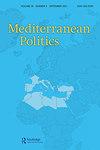Competing visions for the EU’s southern strategy: Restraint, preventative engagement, and selective intervention
IF 1.3
3区 社会学
Q1 AREA STUDIES
引用次数: 0
Abstract
ABSTRACT The most powerful European Union (EU) member states have suffered devastating terrorist attacks in the past decades and identify Islamist terrorism as one of the most pressing threats to their national security. They recognize that instability in the southern neighbourhood has exacerbated the threat Islamist terrorism poses to their national security. Adopting an intergovernmental approach, I argue that member states’ southern strategies are a product of threat perceptions and policy response preferences. This article creates a typology of security strategies through using content analysis to categorize EU member states’ threat perceptions and policy response preferences as indicated in national security strategies produced in 2009–2018 period. Based on my analysis of member states’ threat perceptions and policy response preferences to threats emanating in the southern neighbourhood, I conceptualize three southern security strategies: restraint, preventative engagement, and selective intervention. Based on this typology, I identify the EU member states’ southern security strategy. Focusing particularly on the most powerful EU member states, namely the EU-5 , I then apply this typology to make some tentative predictions on the shifts in the EU’s southern strategy post-Brexit. I expect the EU’s southern security strategy to shift towards one of selective intervention in the post-Brexit period.欧盟南部战略的不同愿景:克制、预防性接触和选择性干预
在过去的几十年里,最强大的欧盟成员国遭受了毁灭性的恐怖袭击,并将伊斯兰恐怖主义视为对其国家安全最紧迫的威胁之一。他们认识到,南部邻国的不稳定加剧了伊斯兰恐怖主义对其国家安全构成的威胁。采用政府间方法,我认为成员国的南方战略是威胁感知和政策反应偏好的产物。本文通过内容分析对欧盟成员国在2009-2018年期间制定的国家安全战略中所显示的威胁感知和政策应对偏好进行分类,创建了一个安全战略类型学。基于我对成员国的威胁感知和对南部邻国产生的威胁的政策反应偏好的分析,我概念化了三种南部安全战略:克制、预防性接触和选择性干预。基于这一类型学,我确定了欧盟成员国的南方安全战略。我特别关注最强大的欧盟成员国,即欧盟五国,然后运用这种类型学对英国脱欧后欧盟南部战略的变化做出一些初步预测。我预计,在英国脱欧后的时期,欧盟的南部安全战略将转向选择性干预。
本文章由计算机程序翻译,如有差异,请以英文原文为准。
求助全文
约1分钟内获得全文
求助全文
来源期刊

Mediterranean Politics
Multiple-
CiteScore
4.40
自引率
5.90%
发文量
37
期刊介绍:
Mediterranean Politics is the only refereed academic journal to focus on the politics, international relations and political economy of the entire Mediterranean area - "Mediterranean" here being understood to refer to all those countries whose borders are defined partially or wholly by the Mediterranean Sea. This focus involves consideration not only of the region itself, but also the significance of developments there for other parts of the world. The journal analyses the central issues that concern Mediterranean countries and assesses both local and international responses to them. While its prime concern is with political developments, the focus of Mediterranean Politics extends to all the factors and dimensions affecting political life.
 求助内容:
求助内容: 应助结果提醒方式:
应助结果提醒方式:


